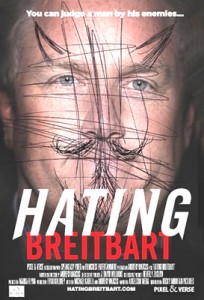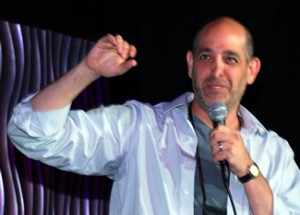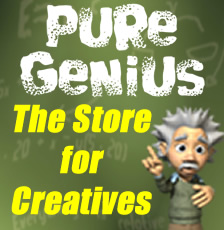Anthem Film Festival – Gutsy Truth and Economic Truth
(First published on blogcritics.org)
Two approaches to serving up the truth were offered on Thursday, July 11, at the Anthem Film Festival: the gutsy, gritty, in-your-face truth of main stream media vitriol in Hating Breitbart, and the complex, subtle and intellectual economic truth of I, Pencil.
Hating Breitbart
 Filmmaker Andrew Marcus began filming Andrew Breitbart’s life two days after the ACORN story broke. ACORN (Association of Community Organizations for Reform Now) was a media and liberal establishment favorite and was funneled an endless stream of tax dollars to carry on “community organizing”. Breitbart brought to the public’s attention the work of James O’Keefe who exposed ACORN for the corrupt political patronage machine it was. Several times the media tried to cover for ACORN; each time Breitbart one-upped them.
Filmmaker Andrew Marcus began filming Andrew Breitbart’s life two days after the ACORN story broke. ACORN (Association of Community Organizations for Reform Now) was a media and liberal establishment favorite and was funneled an endless stream of tax dollars to carry on “community organizing”. Breitbart brought to the public’s attention the work of James O’Keefe who exposed ACORN for the corrupt political patronage machine it was. Several times the media tried to cover for ACORN; each time Breitbart one-upped them.
Marcus’ team continued to follow Breitbart through two and a half years of controversies, including the black caucus accusations that the tea party was racist, and the Shirley Sherrod controversy. Throughout all of these, the main stream media tried to paint Breitbart as a liar and a racist.Hating Breitbart shows not only that they failed, but demonstrates the depths of duplicity they went to trying to smear Andrew Breitbart.
After the screening during a Q&A, an audience member asked if Marcus thought that the continued stress that the mainstream media placed Breitbart under had anything to do with his deadly heart attack. Marcus said, “I’m certain it contributed to it. You can say all the negative coverage doesn’t bother you. Think about it. When you come home and your wife and child are watching the TV and people are calling you a liar and worse, of course your family supports you, but that has got to have an effect.”
My cynicism about “reality television” made me wonder if any of Hating Breitbart was staged. I spoke with Marcus after the formal Q&A to ask him if any of the film had been created “reality TV style”. “Absolutely not,” he said. “Everything is real. We were flies on the wall. Andrew let us go everywhere with him.”
I had another more personal question to ask Marcus. This was the second time I had seenHating Breitbart. As I watched this time I felt an uncharacteristic pessimism, and sense of loss. It felt to me like a tremendous hole was left in the conservative movement by the loss of this man. I asked Marcus if he saw anyone who could walk in Breitbart’s shoes and who could do what he did?
“I see people who do parts of what Andrew did”, Marcus said, “but not the whole package. One thing to consider is the people who made it their life’s work to attack Breitbart. You saw them in the film. Who do they spend their time attacking now? Michele Malkin.”
I, Pencil
During the John Stossel’s Fox Business Channel show recorded at FreedomFest, someone asked whether Libertarians were different from “normal people”.
“Well,” one of his guests quipped, “we read books.”
But what about those people who don’t read books? Not even short ones like Leonard Read’s essay I, Pencil: My Family Tree as Told to Leonard E. Read ? How do you reach them? One solution: make it a movie – I, Pencil.
After the screening of the film, Fred Smith and Lawrence Reed, of the Foundation for Economic Education, joined I, Pencil filmmaker Drew Tidwell to discuss how to reach non-readers and the next generation of young people with the truth about economics and freedom.
Tidwell said that making I, Pencil into a film had been a passion project for him for several years.
Smith agreed that this was an important step. “The basic principles of a free society are simple, but are not often communicated very well,” he said. “We need more creative ways of expressing the virtues of a free society because nothing has done more in the world to improve people’s lives. Movies like this are starting point.”
Lawrence Reed said he knew Leonard Read for the last 33 years of his life. “He had an intense magnetism,” he said. “Whenever he was in a room you could not ignore him. But at the same time he had humility. I don’t mean self-depredation. No, it was a realization that no matter how much you know, there is a universe of stuff you don’t. He felt you should embark on a lifetime of learning, instead of medaling in the life of other people.” Reed added, “Washington is full of of people who need to learn this lesson.”
Fred Smith said that what he thought was the most important message of I, Pencil is that markets are much more creative than any individual in meeting human needs.
An audience member asked how to combat the Left’s emphasis on central planning, localism and a return to nature?
Smith said that localism is really a return to tribalism and this contradiction should be pointed out. “Mary your own kind, hate the foreigner, and don’t buy anything made more than five miles away go together,” he said. “Liberals see themselves as open and internationalists, yet localism is builds walls around you.”
Reed added, smiling, “I used to eat only natural foods, until I learned that most people die of natural causes.”
Another audience member asked if the film was being offered to schools?
Tidwell said that CEI (Competitive Enterprise Institute) is actively trying to do that. “They have a curriculum for teachers and breakout videos which go deeper into certain of the ideas,” he explained.
Smith added, “The goal of our whole movement is to bridge the gaps between the entrepreneurs and those of us trying to explain why what they do is good for people. The Left has done a better job of integrating doers and thinkers.”
Another audience member said he thought there was a contradiction between the cooperation the film emphasized and the competition of the real world.
Smith agreed that the concept of voluntary exchange is confusing. “We are all competitors,” he said, “but at other times we need to cooperate. The person you might be competing with today, you may be cooperating with tomorrow. Half my family doesn’t understand this, but I don’t want to write them off.”
Reed said that we even have to try to reach the socialists. “All babies are socialists,” he explained. “They want what they want, they want it now and if they don’t get it, they cry. Socialism is babies with guns.”
The last question from the audience had to do with the “huge salaries” paid to CEO’s.
Smith said that the concept of compensation was very complicated. “A company doesn’t want to overpay or under pay. If you get compensation way out of line you will lose workers and managers and someone else is going to do better than you. CEO salaries are high because we are globalized. You have to compete worldwide.”
Reed added, “We should remember to count our blessings and don’t count the other guy’s blessings.”
For information about I, Pencil and supporting educational materials visithttp://ipencilmovie.org/.




